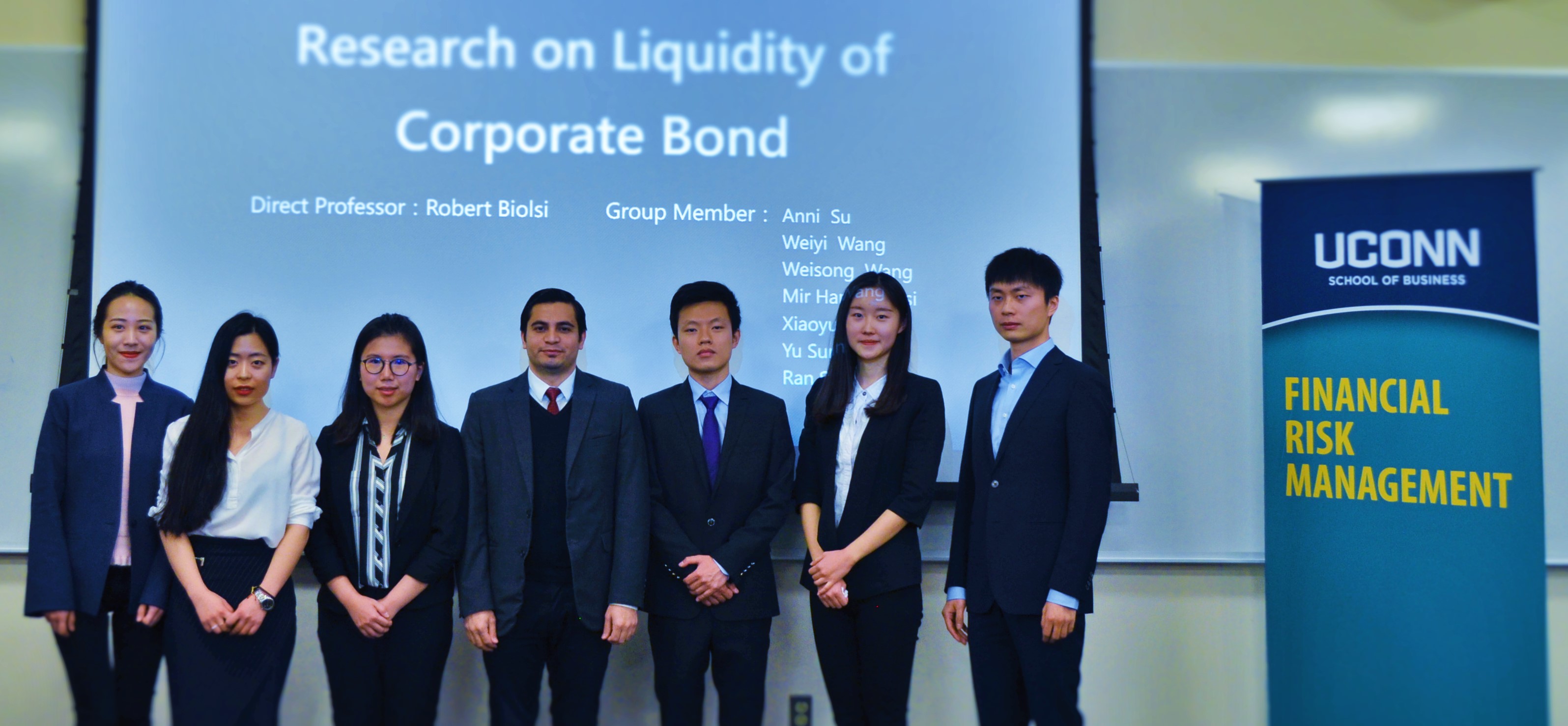With a strong emphasis on real world financial applications, the program incorporates practical coursework in Law, Accounting, Mathematics, Finance and Business. We are proud to announce that the Master of Science in Financial and Enterprise Risk Management (MSFERM) Program was approved for a STEM Designation.
If taken full-time, The MS in Financial and Enterprise Risk Management Program is a lock-step program which requires 36 or 33 credits to be completed in four consecutive semesters. There are eleven full-semester 3-credit courses for domestic students and twelve full-semester 3-credit courses for international students.
In addition, in response to student requests, we are offering the option to take an additional semester which culminates in receiving a concentration in Quantitative Methods in Risk Management. This additional semester will include two courses on advanced and quantitative applications in Financial Modeling and Financial Engineering, and a comprehensive course on Enterprise Risk management (ERM). This change will extend our 15-month program to 19-months. This will change the total number of courses to fourteen full-semester 3-credit courses for domestic students and fifteen full-semester 3-credit courses for international students. The students choosing this option will graduate in May rather than in December.
The courses in the program fall into four categories:
Financial Markets
One three credit course provides an overview of financial markets with introduction to various financial instruments and risk management.
Financial Risk Modeling
Three 3-credit courses provide mathematical and statistics background, covering topics such as discrete and continuous stochastic processes, stochastic calculus, statistical analysis of financial data, and the relation between stochastic processes and stochastic differential equations. The courses also provide exposure to a broad range of analytical techniques for asset valuation and risk management. Students will learn numerical methods and Monte Carlo simulation techniques for solving practical asset valuation problems.
Financial Risk Management
Three 3-credit courses provide an open discussion of underlying theory of risk assessment in asset valuation and financial markets, and the modeling and valuation of cash flows. They focus on development of estimation techniques for valuation, measurement and mitigation of risk of financial securities including equity and fixed income assets (MBS, CMBS), derivatives and exotics. Students will also examine the use of risk management tools by hedge funds in constructing numerous strategies such as long and short, portable alpha, merger arbitrage, convertible arbitrage, and carry trades.
Applied Projects
The applications area includes four 3-credit courses: two traditional courses and two seminar-style courses that expose students to current practices and provide real project experience. The two traditional courses in this area will expose students to accounting and legal issues associated with implementation of internal control systems.
The first course on legal issues will provide the student the necessary background to identify and analyze the legal and accounting aspects of financial risk management. Legal aspects include compliance with regulation governing securities trading, disclosure, contract law and the fiduciary responsibility of financial institutions.
The other three courses (Applications in Risk Management Seminars) will be provided in a case format. Several modules will be presented over two semesters, including Hedge Fund Strategies, Enterprise Risk Management, and Development & Implementations of Risk Management Models. Academic credit for the second semester Applications course will be awarded upon completion of a Masters project which may carry over into the 4th semester.
The required sequence of courses is shown in the Course Sequence section of this website. To help employed students meet the requirements, selected courses in the program may be presented online, especially during the summer semesters. Typically three courses will be required each summer.
One 1.5-credit semester-long course serves as a capstone to review and tie together the learning from all courses throughout the program. One 1.5-credit course serves to grade the Risk Management Capstone Projects.
Real World Learning
The MS in Financial and Enterprise Risk Management is designed to provide a "Real World Approach to Risk Management Theory." To gain this real world exposure, each student in the MSFERM Program must complete a Capstone Project and an Experiential Learning Requirement (ELR).
The real world approach is also integrated into the program in multiple ways, including the use of practicing risk management executives in the classroom, and many events with professional organizations outside the classroom.
New - The MSFERM Fund is now accepting applications from all 2nd year MSFERM students and entering Accelerated MSFERM students, with some business/finance background. Regular MSFERM students must commit to the full 2nd year, including the 5th semester. Apply now for Fall '25
Capstone Group Projects
Capstone Group projects are graded as part of FNCE 5334 and run like a consulting job. More information is below:
Capstone Group Projects
Participation in a company-sponsored risk management project that has been approved by the Academic Director. Submission of a final report to the Academic Director is required.
The Capstone Project runs like a consulting job. The MSFRM Program receives projects from many companies in a variety of sectors. These projects are challenging and provide a tangible link between academic learning and their applications in the business world. Through these projects, students gain exposure to real risk management situations and challenges that company executives and corporations encounter. Students enhance their presentation skills through face-to-face personal dealings with practitioners in the field of risk management.
Students join a team and designate a team lead. Advisors and a contact within the projects respective companies are appointed to each team. Students setup tollgates with their company contact and present their results and findings to their company at the end of their first spring semester.
Below is the list of companies that submitted projects in the past:
Hartford HealthCare
State of Connecticut
Ernst & Young - China
UConn Foundation
Morgan Stanley
Stutland Option Group
CME Group
Synchrony Financial
Wylan Energy
Echo Bay Partners
Tradeweb
Experiential Learning Requirement
Perhaps the most important way the MSFRM program delivers on the “Real World Approach to Risk Management Theory” is via its Experiential Learning Requirement. Though there is a wide range of options that can be chosen by the student, they all deliver the real world experience that this requirement demands.
The importance of this real world experience, and the options for meeting it, is in its providing students with the following:
- A tangible link between their academic learning and the application of this learning in the business world.
- Exposure to real risk management situations and challenges that company executives and corporations encounter.
- Face-to-face, personal dealings with practitioners in the field of risk management, through which classroom learning is enhanced and augmented.
- An opportunity for students to augment and/or apply their risk management knowledge, their critical thinking and ideally their skills of persuasion. All options must include the application of techniques of risk management, as well as exposure to risk management theory as practiced outside the classroom.
There are many mutually exclusive ways for a student to complete the ELR, as noted in the student options below:
Internship or Job
Either a full-time or a part-time, paid or unpaid internship, or a full-time or part-time job, with an approved company or organization by the Academic Director. This requires a completed application that indicates risk management-related responsibilities/tasks, and that must be approved by the Academic Director.
Note: Students on an F-1 Visa will need practical training (CPT) authorization and must contact UConn International Student and Scholar Services for further information.
Student Managed Fund – SMF
The UConn, School of Business, Student Managed Fund is an investment fund endowed by the UConn Foundation. The Selection committee accepts applications from graduate students in Hartford and Stamford who are committed, motivated, and disciplined individuals interested in understanding the valuation of companies, and wish to see the process applied in practice. This skillset will be useful for students who wish to pursue a career in investments, money management and many other careers in finance.
The selection criteria includes academic abilities, professional history, and an appetite for working in an intense team environment.
Students that apply, are selected and fully participate to be a part of the UConn, School of Business, Graduate Student Managed Fund satisfy the Experiential Learning Requirement.
Financial Risk Competitions
(as approved by the Finance Department Head or Academic Director)
Students may participate in competitions throughout their time in the program. Competitions are a great way to learn real world applications of risk management. Students are proud to represent UConn and our program.
Students have participated in the following competitions:
Rotman International Trading Competition
Chicago Quantitative Alliance Challenge
Professional Risk Managers International Association Risk Management Challenge
Group Student Project
Co-workers in a company-sponsored risk management project, which requires a proposal be submitted to the Academic Director for approval prior to project work starting and a final report that must be approved by the Academic Director.
Individual Student Project
Similar to the Group Student Project, but without project co-workers, this company-sponsored project requires a proposal be submitted to the Academic Director for approval prior to project work starting and a final report that must be approved by the Academic Director.
Global Research Paper
Similar to the Individual Student Project option, this Research Paper requires a proposal to be submitted to the Academic Director for approval prior to work starting, and then the final submission to be approved by the Academic Director. Unlike the Individual Student Project, however, this Research Paper will not be focused on a company-sponsored topic but rather on a global risk management topic of the student’s choosing. Examples of topics include Risks Inherent in Business Expansion into a (specific) Foreign Country and Risks of Conducting Business in a (specific) Foreign Country.

